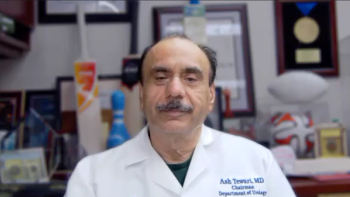
Oncology NEWS International
- Oncology NEWS International Vol 11 No 8
- Volume 11
- Issue 8
Program Educates Teens About Testicular Cancer Self-Exam
WASHINGTON-The incidence of testicular cancer, which predominantly targets young men aged 15 to 35, has nearly doubled in the past 70 years and continues to increase. Few in the vulnerable age group, however, are aware of the simple
WASHINGTONThe incidence of testicular cancer, which predominantly targets young men aged 15 to 35, has nearly doubled in the past 70 years and continues to increase. Few in the vulnerable age group, however, are aware of the simple self-examination that can catch the disease at a stage when it is more than 90% curable. Indeed, this cancer has a taboo status in society, much like that of breast cancer before the 1970s, said Elaine E. Kocsis, RN, OCN, CCRP, clinical research nurse, South Pointe Hospital/Cleveland Clinic Health System (CCHS), Warrensville Heights, Ohio.
An educational initiative aimed at adolescents and suitable for delivery in high school health classes has brought the word to youngsters in Ohio, she reported at the 27th Annual Congress of the Oncology Nursing Society (abstract 38). She described the "TC Check" (Teen Cancer Check) program. To date, the team has educated more than 2,500 high school students, 300 college students at Ohio State University, Columbus, and others at health fairs.
The program uses a variety of materials featuring a cartoon character named TC Check. A dancing check mark, TC urges people to "Check ’em out every month." In addition, the efforts of such celebrities as bicyclist Lance Armstrong, comedian Tom Green, and figure skater Scott Hamilton to raise awareness of testicular cancer have also attracted youngsters’ interest, she said.
High school health curricula generally do not include information about cancer, although school health educators have been very receptive once the issue is brought to their attention, she said. Crucial to acceptance into the high school curriculum is convincing school authorities that the issue concerns health, not sexuality.
A team of visiting health professionals presents the program to classes, and participation of male presenters adds substantially to the impact. It is "very good for boys" to see a male nurse, and the cooperation of a testicular cancer survivorJohn Webb from Twinsburg, Ohionot much older than the students themselves, has been "critical," she said.
Health classes in the United States typically are co-ed, so the program also includes a component on breast cancer and breast self-exam (BSE). Videos, talks, anatomical models, and handouts are used to impart information. The entire group watches the first half of "Jason’s Story," a film about a testicular cancer patient who succumbed at 19. Classes are then divided, and the boys see the second half, which explains self-exam. Girls, meanwhile, watch a film about BSE for teens.
Students learn about the signs, symptoms, and risk factors of these cancers, the correct technique for performing examinations, and the importance of regular self-exams. A "TC Jeopardy" game serves as both reinforcement and a test.
In immediate post-testing, 95% of those exposed to the program found it helpful and none found it unhelpful. Ms. Kocsis said that 67% of the boys and 74% of the girls reported receiving new information.
On post-test at 7 weeks, 90% of the boys and 89% of the girls called monthly self-exams important, and 65% of the boys and 45% of the girls claimed to be doing them. In Lyndhurst, Ohio, students at Brush High School were so impressed with the program that they raised $600 at a charity rock concert to help support it.
Teens use the information to protect their own health, and many also bring the message home to help protect their families, Ms. Kocsis noted. One father, educated about testicular self-exam by his son, for example, found a lump, which fortunately did not prove cancerous.
"Jason’s Story" can be obtained from the Jason A. Struble Memorial Cancer Fund (
Ms. Kocsis’ colleagues in the study were Ms. Shankman, CCHS, Mayfield Heights; Barbara Demagall, RN, South Pointe Hospital/CCHS; and Richard M. Garwood, DO, medical director/liaison, TC Check Pogram, CCHS.
Articles in this issue
over 23 years ago
Prostate Cancer Cell Line Vaccine Promising in Phase II Trialover 23 years ago
MoAb Targeting Death Receptor in Breast Cancerover 23 years ago
Hanford I-131 Releases Did Not Increase Thyroid Cancer Riskover 23 years ago
Chemo/Rituximab Is Effective as First-Line CLL Therapyover 23 years ago
Diagnostic Dilemmaover 23 years ago
Viral Agent ONYX-015 Targets p53-Deficient Cancer Cellsover 23 years ago
Better Colon Cancer Imaging With PET/CT Than With PET AloneNewsletter
Stay up to date on recent advances in the multidisciplinary approach to cancer.




































